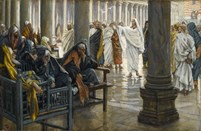
1. Read 2. Study 3. Repeat
A quick attempt to find it through a search on Google has come up empty, so maybe I am the first to notice the irony of Matthew 24:4. Matthew 24 is quite a difficult passage describing the destruction of Jerusalem and Christ’s return. As I do my study on it and consult the commentaries I have at my disposal, Matthew 24:4 keeps jumping out at me:
(Take heed) See that no one (no man) leads you astray. – ESV (ASV)
Take heed that no man (no one) deceive you. – KJV (NKJV)
There are as many varied explanations of Matthew 24 as there are commentaries apparently. Which the one is the one that will not lead me astray?
Put the commentaries down because the key to understanding a passage like Matthew 24 is lots of Bible study. There is no way to properly understand a difficult passage without solid grounding in the easier to understand portions of the Bible. People get away with diverse teaching of the Scriptures because in general, we are not reading and studying our Bibles like we should. We are not catching them in the act!
Reading and studying.
Did you see the emphasis? The word “and” is in bold, italics and underline.
Daily devotional reading is an excellent habit and a required part of developing our Bible knowledge. The “study” part is even more important to the development of a full understanding. When we take the time to answer the who, what, when, where, and why of a passage, we begin the process of building a well-grounded foundation for understanding the Bible.
What works as a complete Bible program for me looks something like this:
- Daily reading schedule – Dedicate a certain amount of time for a straight reading of the text
- Reflection on what was read – I choose to write about what I have read each day in this blog, you might choose to do a word study, or write a journal entry, or discuss with a family member.
- Formal Bible study attendance – as in … go to your congregation’s offerings at every opportunity
- Analyze what was taught in sermons and Bible classes – Don’t take another solely at his word.
It is definitely a challenge to work out the routine and the details. The main thing I tell others to do is to just get started.
What is one thing you can add to your Bible study habits to take yourself to the next level?













February 10, 2014
Comments Off on How a Little White Lie is Not Little or White